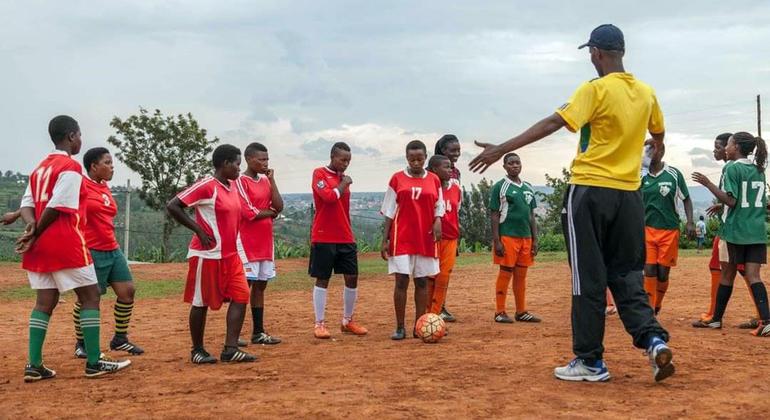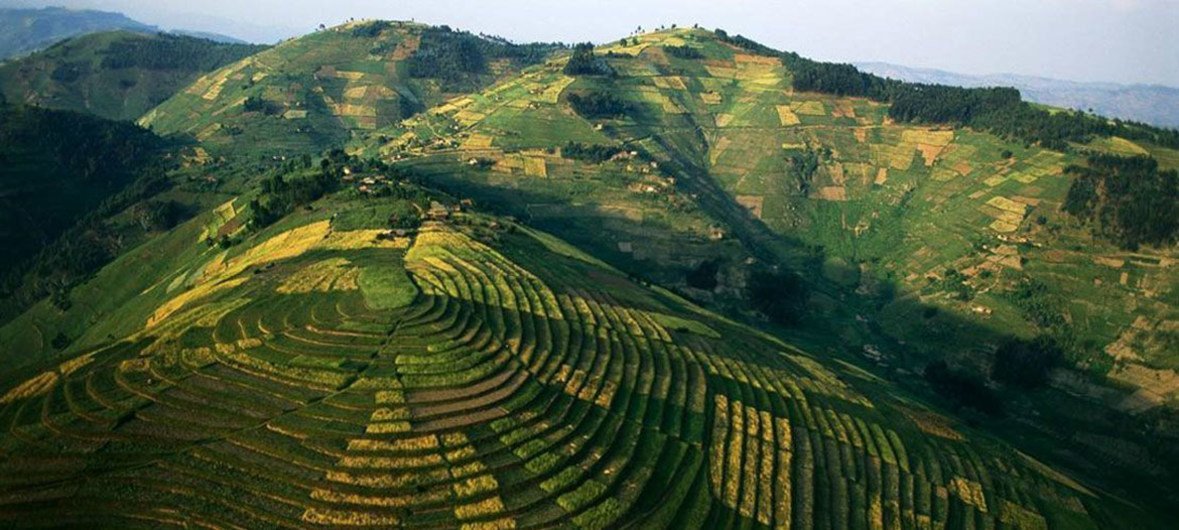The Survivor Shielded by a Mass Murderer: A Tale of Perseverance and Hope
 When the Genocide against the Tutsis in Rwanda began in April 1994 Eric Eugene Murangwa was a footballer at one of the country’s top clubs. Although he is a Tutsi, he was protected by a member of the notorious Interahamwe, responsible for killing hundreds of thousands. Ahead of the 30th anniversary of the genocide, marked on 7 April, Mr. Murangwa shared his extraordinary story with UN News.
When the Genocide against the Tutsis in Rwanda began in April 1994 Eric Eugene Murangwa was a footballer at one of the country’s top clubs. Although he is a Tutsi, he was protected by a member of the notorious Interahamwe, responsible for killing hundreds of thousands. Ahead of the 30th anniversary of the genocide, marked on 7 April, Mr. Murangwa shared his extraordinary story with UN News.
In the early 1990s, Mr. Murangwa was a star player for Rayon Sports in the capital Kigali. As a Tutsi, his life was in extreme danger when the 100-day genocide, which led to over 800,000 people, overwhelmingly Tutsi, being killed.
His status as a well-known footballer saved his life many times, and prompted him to start his own organization, today known as the Ishami Foundation, which uses the power of sport to build tolerance and peace.
Mr. Murangwa told UN News that, the day before the killings began, he and his friends had no idea of the horror that was about to unfold.
This interview has been edited for clarity and length.
“It was a normal day like any other day, a very beautiful, sunny day. I was training with teammates, preparing for a game against a Kenyan team. We finished a bit earlier on that day because we wanted to go and watch African Nations Cup games, so we jumped into our club bus and were driven to different places where people wanted to go to watch the game.
I went to a hotel near my apartment to watch the second game, which finished about 11 PM Kigali time. As I was leaving the hotel, I saw a group of people saying that something had exploded. One of them was pointing at the airport [a plane carrying Rwandan President Juvénal Habyarimana had been shot down. The event is commonly cited as a trigger of the genocide].
At the time it wasn’t unusual to hear explosions in Kigali. We had been going through a war for almost four years and we were pretty much used to it, so I just went home to sleep.
At around 3AM, I was woken by heavy gun fire, not far from my apartment. My roommate and I were trying to work out what was going in. We thought it might be a coup or fighting between government soldiers and the RPF rebels. About an hour later I listened to France International Radio (RFI) and learned that President Habyarimana’s plane had been shot the night before, and the president himself was killed, along with all of those who were on board. By 6AM I ventured outside of my home, and that’s when I learned that killings were already taking place in the neighbourhood.
‘First we will kill the cockroaches, then we will play football’
One of the important reasons that I survived was because of a man called Jean-Marie Vianney Mudahinyuka, otherwise known as Zuzu, who was on the board of the football club.
Zuzu was very well known at Rayon Sports. He was a very interesting guy, very funny, and well known for his jokes. He also happened to be a member of the ruling party’s militia group, known as the Interahamwe [the Interahamwe have been described as the main perpetrators of the genocide].
One of my teammates suggested that I should go to Zuzu’s place. I thought he was out of his mind. But he was convinced that Zuzu would help me and, when we arrived at his compound, he came out laughing and said ‘you know, Toto’ – that was my nickname – ‘don’t worry, come and I will protect you. When we finish off the inyenzi (that was the nickname given to the RPF soldiers or pretty much all Tutsis, it means cockroach in Kinyarwanda), we’ll go back and play football’.
I stayed with him for two weeks. Then he told me that he was planning to leave the city, so he took me to the Red Cross headquarters, in downtown Kigali.
[Mr Murangwa was not admitted to the Red Cross compound, but found refuge at the Hotel Des Milles Collines, which saved hundreds of lives, a story retold in the film Hotel Rwanda. He was then evacuated to a camp for internally displaced persons].
After that, I didn’t see Zuzu for many years, but I heard that he was caught in the U.S. and extradited back to Rwanda. By then I was involved in a documentary on my life story, and I wanted to reach out to him to understand why he helped me. I went to the prison he was in and, at first, he told me that he was happy to be involved, but later he refused.
Today, I don’t feel anything about him. Yes, he played a part in my survival, but he has also been accused and found guilty of unimaginable atrocities. I have completely washed my hands of him.

Elie NTIRENGANYA/GLF Nairobi 2018
Rwanda-Northern-Karongi this place was high risk zone for people, after relocation now is a green mountain made of terraces.
‘Rwanda is a country that gives you hope’
When I went to live in Europe, it was because I couldn’t see myself being in Rwanda soon after the genocide. I really feared for my life because we had infiltrators coming from across the border, looking for survivors and targeting those they knew had survived. In fact, in late 1995, a group of people were caught, and when they were interrogated, it was revealed that my name was on a list of people that they were targeting. The Rwanda of that time was a country full of fear, hopelessness, anger and poverty.
But today, Rwanda is a country that gives you hope. It is a country that shows that you can live peacefully with your neighbours. And that has given me the courage and the need to relocate back to my home country.
I never imagined that it was ever going to be possible for the Hutu and Tutsi community to live side by side again, given what we had just gone through. But the young people, those born within the last 30 years, are completely different. They show me that there is a much better life ahead for Rwandans.
But, having said that, when you have gone through what we’ve gone through, it doesn’t matter where things are; in the back of your mind, there is always that feeling of “what if”.
And then, when you see what’s going on around us in the region, where similar things are taking place in some neighbouring countries. It reminds me that, as far as Rwanda has come, there is always a danger that things can unravel and go back to how things where all those years ago”.
Simon Blake is an experienced journalist deeply interested in international affairs and global development. Having spent years reporting on humanitarian issues, he offers a unique perspective in his coverage of United Nations news.




When the Genocide against the Tutsis in Rwanda began in April 1994, Eric Eugene Murangwa was a footballer at one of the country’s top clubs. Although he is a Tutsi, he was protected by a member of the notorious Interahamwe, responsible for killing hundreds of thousands. Ahead of the 30th anniversary of the genocide, marked on 7 April, Mr. Murangwa shared his extraordinary story with UN News. In the early 1990s, Mr. Murangwa was a star player for Rayon Sports in the capital Kigali. As a Tutsi, his life was in extreme danger when the 100-day genocide, which led to over 800,000 people, overwhelmingly Tutsi, being killed. His status as a well-known footballer saved his life many times and prompted him to start his own organization, today known as the Ishami Foundation, which uses the power of sport to build tolerance and peace. Mr. Murangwa told UN News that the day before the killings began, he and his friends had no idea of the horror that was about to unfold. This interview has been edited for clarity and length. “It was a normal day like any other day, a very beautiful, sunny day. I was training with teammates, preparing for a game against a Kenyan team. We finished a bit earlier on that day because we wanted to go and watch African Nations Cup games, so we”
“I am truly inspired by Mr. Murangwa’s story of survival and resilience in the face of such atrocities. It goes to show how humanity and compassion can still exist even in the darkest of times.”
It’s truly remarkable how Mr. Murangwa’s passion for football not only saved his life but also inspired him to create positive change through the Ishami Foundation. His story is a testament to the resilience of the human spirit.
What an incredible story of resilience and bravery! Could you elaborate on how Mr. Murangwa’s experience as a footballer influenced his work with the Ishami Foundation?
As someone who also played football, I can understand how the discipline, teamwork, and perseverance required in the sport would have influenced Mr. Murangwa’s approach to building tolerance and peace through the Ishami Foundation. Sports have a unique way of bringing people together and fostering a sense of community, which aligns perfectly with the Foundation’s mission. His background as a footballer likely instilled in him the values of fair play, respect, and determination, which are essential for promoting unity and understanding among individuals from diverse backgrounds.
In the early 1990s, Mr. Murangwa was a star player for Rayon Sports in the capital Kigali. As a Tutsi, his life was in extreme danger when the 100-day genocide, which led to over 800,000 people, overwhelmingly Tutsi, being killed. His status as a well-known footballer saved his life many times, and prompted him to start his own organization, today known as the Ishami Foundation, which uses the power of sport to build tolerance and peace. Mr. Murangwa told UN News that the day before the killings began, he and his friends had no idea of the horror that was about to unfold. This interview has been edited for clarity and length. “It was a normal day like any other day, a very beautiful, sunny day. I was training with teammates, preparing for a game against a Kenyan team. We finished a bit earlier on that day because we wanted to go and watch African Nations Cup games, so we”
As a football enthusiast myself, Eric Eugene Murangwa’s story is truly inspiring. It’s incredible to see how his passion for sports not only saved his life but also motivated him to promote peace and tolerance through the Ishami Foundation. His courage and resilience in the face of such unimaginable adversity are commendable.
As a sports enthusiast, I am deeply moved by Eric Eugene Murangwa’s resilience and dedication to promoting peace through his foundation. His story serves as a powerful reminder of the impact one individual can have in the face of immense adversity.
It’s truly inspiring to read about Mr. Murangwa’s resilience and determination in the face of unimaginable horror. His story is a testament to the strength of the human spirit. Sport has the power to bring people together and heal wounds. Thank you for sharing this moving account.
In the early 1990s, Mr. Murangwa was a star player for Rayon Sports in the capital Kigali. As a Tutsi, his life was in extreme danger when the 100-day genocide, which led to over 800,000 people, overwhelmingly Tutsi, being killed. His status as a well-known footballer saved his life many times, and prompted him to start his own organization, today known as the Ishami Foundation, which uses the power of sport to build tolerance and peace. Mr. Murangwa told UN News that, the day before the killings began, he and his friends had no idea of the horror that was about to unfold. This interview has been edited for clarity and length. “It was a normal day like any other day, a very beautiful, sunny day. I was training with teammates, preparing for a game against a Kenyan team. We finished a bit earlier on that day because we wanted to go and watch African Nations Cup games, so we”
Wow, what an incredible story of survival against all odds. Mr. Murangwa’s courage and resilience are truly inspiring. It’s amazing how even amidst such tragedy, he found a way to use his passion for football to promote peace and unity. Thank you for sharing this powerful testimony.
In the early 1990s, Mr. Murangwa was a star player for Rayon Sports in the capital Kigali. As a Tutsi, his life was in extreme danger when the 100-day genocide, which led to over 800,000 people, overwhelmingly Tutsi, being killed. His status as a well-known footballer saved his life many times, and prompted him to start his own organization, today known as the Ishami Foundation, which uses the power of sport to build tolerance and peace. Mr. Murangwa told UN News that, the day before the killings began, he and his friends had no idea of the horror that was about to unfold. This interview has been edited for clarity and length. “It was a normal day like any other day, a very beautiful, sunny day. I was training with teammates, preparing for a game against a Kenyan team. We finished a bit earlier on that day because we wanted to go and watch African Nations Cup games, so we”
As a sports enthusiast, I find Mr. Murangwa’s story truly inspiring and powerful. His resilience and determination to promote tolerance and peace through sports is commendable. It’s incredible how a passion for football not only saved his life during such a dark period but also led him to establish the Ishami Foundation. The world needs more individuals like him who use their platform for positive change.